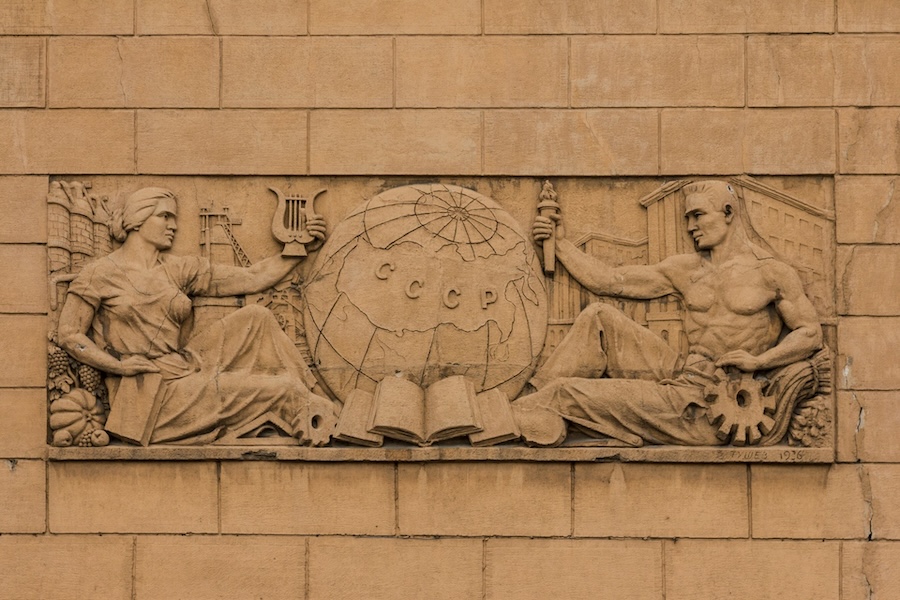When academic freedom is reduced to funding and accountability to funders, the Soviet period seems much more advantageous than the modern one in the eyes of Russian teachers.
At the author’s request, the name is not published.
Photo: “And I can say that it has only gotten worse.” Photo by Soviet Artefacts on Unsplash
About the Terminology
Academic freedom relates to the activities of an individual scientist and implies the ability to teach and conduct research at one’s own discretion, and in accordance with one’s objectives, without fear of punishment or dismissal. When in compliance with the principles of academic freedom, the university administration and external organizations do not interfere with the activities of teachers or researchers.
Initially, academic freedom was interpreted as the freedom of a teacher to decide what and how to teach. Later, this concept was extended to scientific activity and over time even became more associated with conducting scientific research.
Academic freedom and the perception thereof are influenced by a variety of factors, including political, historical, cultural, and ideological context.
About the Research
How do Russian teachers perceive academic freedom and how it has changed since the Soviet period?
Opinions on this were gathered during 30 in-depth interviews conducted in 2023 with instructors at two Russian universities—one in the capital and one in the regions. All interviewees had at least one post-graduate degree and worked in various fields of the natural and social sciences. Two-thirds had worked in a university during the Soviet era.
Opinions collected from younger interviewees illuminated what memories of the Soviet era had been passed on to them by their parents and older colleagues.
It should be emphasized that we collected opinions, which are not equivalent to precise knowledge.
What Is Freedom?
In both universities, there were respondents with positive and negative assessments of the state of academic freedom in Soviet times compared to today. At the same time, not everyone was ready to discuss this issue freely and openly. This was evident from the fact that when answering various questions, interviewees sometimes got caught in logical contradictions.
Interviewees were not offered any particular definition of academic freedom. They each had individual interpretations, which revealed how well they understood the concept overall.
It turned out that conceptions of academic freedom were far removed from canonical definitions. Often, there was confusion. For example, academic freedom was associated with the need to engage in various kinds of report-writing and paperwork. This paperwork, of course, takes time away from research or preparing lectures, but it does not necessarily limit research topics or how a subject is taught.
Academic freedom is more often associated with academic instruction than with scientific research. When assessing the state of academic freedom in science, the most discussed issues were funding and state priorities, which impose restrictions on creative freedom.
There was practically no mention of aspects associated with internal regulation, censorship, and especially self-censorship.
The question of academic freedom in general puzzled many. Therefore, answers often followed the line that there is and always has been freedom, regardless of historical changes.
“There has always been academic freedom in universities. No one imposes topics from above. You come to the department, you start working on whatever they’re working on…If you rise to a certain level, you can choose what this is. No one will say anything. The main thing is to have your own ideas, proposals.” (Capital university, Doctor [one step above American PhD] of Physics and Mathematics, with Soviet experience)
“…I have written and continue to write articles and can express positions that are not entirely to the liking of the management. There are no issues with this.” (Capital university, Doctor of Economics, no Soviet experience)
As can be seen from the opinions presented, respondents have a simplistic interpretation of academic freedom, seeing it either:
- as a lack of bans on teaching and research; or
- as an opportunity to move in a given direction within a certain organizational structure
Have Academic Freedoms Grown or Shrunk?
Academic Freedoms Have Shrunk
Those who believed that conditions had deteriorated overall linked this to the reduction in creative freedom and the imposition of certain themes and interpretations in teaching and research. This position was mainly expressed by representatives of the social and human sciences, regardless of age:
“Now they give you money, but they say, ‘Think the way you ought to.’ I didn’t like this in Soviet times and I don’t like it now.” (Regional university, Doctor of History, with Soviet experience)
“I think we have too much supervision from above, and they also impose a lot on us. I mean, current teachers have no internal creative freedom: what to teach, how to write, what should be in the curriculum. It seems to me that this was not as strictly regulated in the Soviet period.” (Regional university, Doctor of History, no Soviet experience)
Most interviewees who believe that the situation has worsened attribute this to the emergence of grant funding, which did not exist in the USSR, and the growth of bureaucratic burden and reporting. Both those with Soviet experience and younger interviewees consider the grant system a restriction on academic freedom due to the specific assignment of topics. Grant applications must be tailored to the list of priority areas established by the state.
“The subject matter and the money—they determine the limits of this freedom. Money determines everything.” (Regional university, Candidate of Sciences [equivalent to American PhD] in Physics and Mathematics, with Soviet experience)
“…When applying for grants, you need to indicate how well it corresponds to the priority area. This imposes certain restrictions on us. Especially in the humanities.” (Regional university, Doctor of History, no Soviet experience)
“I always explain to those who are going into the sciences: don’t think you’re going to be able to do what you want…there’s a certain commercial market, and you choose your research priorities based on that. (Regional university, Doctor of Biology, with Soviet experience)
There appeared to be a certain nostalgia for the stability and guaranteed funding that existed in the USSR. Many considered this the keystone of academic freedom—especially because in Soviet times, funds were allocated without the encumbrances of “performance indicators.”
The topic of growing bureaucracy and excessive performance reporting requirements arose frequently. Here, academic freedom was understood as not having to spend time preparing various papers, reports, and the like—a liberty that would today be difficult to find anywhere, not just in Russia.
“The most golden period was the Soviet perestroika years, because there was minimal reporting required for teachers. Then they needed some sort of curriculum, then KPIs appeared. And as a result, teachers stopped feeling free. I hated when the endless paperwork came into the picture. And I can say that it has only gotten worse. Now we are forced to spend the lion’s share of our time writing complete BS, if you’ll excuse the expression. Not even for the sake of reporting, but for some unknown masterminds sitting at a desk somewhere, demanding that training courses be scheduled.” (Regional university, Doctor of Biology, with Soviet experience)
Academic Freedoms Have Grown
A few respondents expressed the opinion that things had improved over time. They drew attention to the fact that there was no longer the ideological pressure that existed in the USSR, nor was there strict control over the content of lectures and presence in the workplace.
“The Soviet university system was, as you know very well, of course, an appendage of this entire huge machine that was supposed to produce the new Soviet person. …It was difficult for us, because the words Marxism, Leninism, and all the derivative terms just caused us to gag. But of course, we made polite faces. That’s why I have no nostalgia for that type of university, no sympathy, no respect.” (Regional university, Candidate of Sciences in Physics and Mathematics, with Soviet experience)
“When I came to the department in 1986, everything was very strict. We were supervised. We had to show our lesson plans. And everything had to be within very strict limits. There is no such thing now. The teacher and the scientist have more freedom.” (Regional university, Doctor of Chemistry, with Soviet experience)
“We have an enormous amount of internal freedom. No one monitors whether I come to work or not. No one monitors whether I even give a lecture or not. We don’t have a prohibitive system. This is great. We can essentially do whatever we want here.” (Capital university, Doctor of History, with Soviet experience)
Are There Any Boundaries to Academic Freedom?
The question of whether academic freedom can be unconditional was also raised. It was argued that it should exist within certain boundaries of loyalty to the state. Otherwise, academic freedom could turn into lawlessness:
“There is always a dispute between freedom and complete lawlessness. …On one hand, it is liberal, good, there is competition between paradigms. But here the question arises whether there is too much freedom. …We must follow certain rules so that our diplomas are accepted by the scientific community. We realized that it would be good if academic freedom had certain standards.” (Capital university, Candidate of Sciences in Economics, no Soviet experience)
“Freedom does not mean anarchy. Limits must be set by legislation, our attitude toward the state, loyalty.” (Regional university, Candidate of Sciences in Law, no Soviet experience)
What Does It All Mean?
Comparing the responses across disciplines and age, representatives of the social sciences of course spoke more often about problems with the choice of topics and the interpretation of results—both in teaching and in research. Therefore, their assessments of academic freedom were more restrained and often negative.
The situation in the natural sciences was well expressed by one interviewee:
“…we have been free both in Soviet and post-Soviet times. You must learn physics and math, that’s not connected to any politics or ideology.” (Capital university, Candidate of Sciences in Physics and Mathematics, with Soviet experience)
Curiously, we found no significant difference in assessments between generations. Among the youth, there were many supporters of Soviet practices. This either reflects the opinions of members of the older generation with whom they have communicated or represents a modern trend toward reviving the Soviet experience.
Our interviews revealed the main difference between the Soviet and subsequent periods. Namely, back then, there was ideological pressure, but budget money was allocated, there were no performance indicators, and there was no need to waste time on grant applications. Neither the Soviet persecution of certain disciplines nor the closed nature of science were recalled.
Now, however, strict priorities and bureaucracy have emerged. These, according to interviewees, have become the main constraints on academic freedom.
When academic freedom is reduced to funding and accountability to funders, the Soviet period seems much more advantageous than the modern one in the eyes of Russian teachers. However, this is a departure from discussing the very essence of the concept of academic freedom. This departure may reflect a real reduction of academic freedom, which is manifested in the caution and self-censorship of most interviewees.





0 Comments